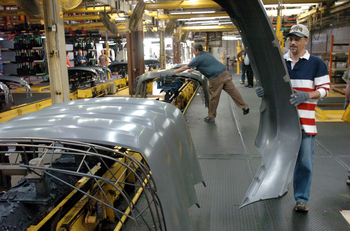Robotics trade association says North American sales hit record highs in 2012
As manufacturing has bounced back in Michigan and across America, a greater reliance on automated tools has led to a record year for the robotics industry. According to a report from the Ann Arbor-based Robotics Industries Association, 2012 was the strongest year ever for robot sales.

The RIA says robots will not replace factory workers, but will require them to learn new skills.
Robert Chase | Ann Arbor News file photo
The greatest increase came in assembly as the automotive industry bounced back from the recent recession.
“It’s promising to see such positive growth in robotics,” RIA president Jeff Burnstein said in a statement.
“… The growth is an indication that more North American companies are looking to automate in order to reduce costs and increase productivity.”
As robots increase their presence in factories, some have been worried that the machines will take the place of employees. Director of communications Bob Doyle said that robots actually are creating more jobs in America, they just require different skills.
“Automation is not only keeping jobs in America but it’s bringing back jobs from overseas,” he said.
“And it’s creating more jobs, better jobs, and higher paying jobs. The problem is that the companies can’t find employees for these jobs because they aren’t technically trained.”
The Michigan Economic Development Corporation has recognized this skills gap and is instituting programs to both re-train workers already in manufacturing and encourage high school graduates to pursue mechanical skills training.
Director of market analysis Alex Shikany said many employers who buy robots have been doing the re-training themselves.
“Robots obviously make you more efficient. They cut your costs and incresase productivity,” he said.
“The money that is saved is then often reinvested in the people who are already there. They [the company] reinvests in the employees, training them for a higher quality of work, better fulfillment and more pay.”
The RIA has been in Ann Arbor since 1986 and is the flagship of the Association for Advancing Automation that also includes a group devoted to vision and imaging and another that works with motion control companies.
The Association for Advancing Automation employs 17 people at its Ann Arbor office and represents manufacturers from 32 different countries. The group focuses on education, networking, market surveys, and industry safety standards.
Ben Freed covers business for AnnArbor.com. You can sign up here to receive Business Review updates every week. Reach out to Ben at 734-623-2528 or email him at benfreed@annarbor.com. Follow him on twitter @BFreedinA2


Comments
Ben Freed
Thu, Feb 14, 2013 : 2:56 p.m.
How many of you out there trust robots to create more jobs? Have any of you seen robots added to your workplace?
Joe Kidd
Thu, Feb 14, 2013 : 8:36 p.m.
Another example of how tech has ended jobs. So its so much better we should shut up over unemployment I guess.
RoboLogic
Thu, Feb 14, 2013 : 7:56 p.m.
There are a lot of Robots where I work. They only create more (high skilled) jobs in automation technology ( my field), while they eliminate jobs in menial tasks. Thats their purpose... to do it faster, more accurate than humans. Yet someone has to fix them when they malfunction. The net effect... more jobs lost than created. We have no choice but to keep up with the rest of the world and this reality is undeniable. Thinking about a career in robotics? Still an excellent choice. A Prof at WCC once told me, "the button pusher and black lung jobs are going to Mexico and elsewhere, leaving highly skilled positions to fix/program all the robots." So far, he is right. What do you prefer? Button pusher for $8/hr... or Robot Tech for $25/hr? Robotics and Controls Engineers...even higher. Other... or concurring points of view are welcome.